


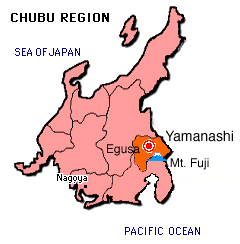 |
|
| Geographical location |
Town of Sutama
Lat. 35° 48' N
Long. 132° 28' E
Access
from Tokyo
about 3 1/3 hours by train
to Hinoharu station
from Hinoharu station
about 15 minutes by bus
from Osaka
about 1 hour by bullet train
to Nagoya sation
from Nagoya
about 3 hours by train
|
Related links
Sutama Town
Yamanashi Prefecture
|
Egusa Niko-Niko Eco-Club
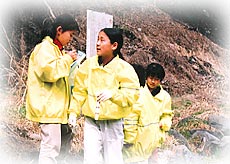 Since it was started in
July 1995, Yamanashi Prefecture's Egusa Niko-Niko Children's Eco-Club has conducted
a variety of local environmental preservation activities in the town of Sutama.
At present, the club consists of 17 members: 5 middle and 7 elementary school
students, and 5 adult supporters.
Since it was started in
July 1995, Yamanashi Prefecture's Egusa Niko-Niko Children's Eco-Club has conducted
a variety of local environmental preservation activities in the town of Sutama.
At present, the club consists of 17 members: 5 middle and 7 elementary school
students, and 5 adult supporters.
The club has two regular activities that it
has been carrying out since it began. One of these is performing water-quality
checks on the Shiokawa, a river running though the Egusa region. In the spring,
club members perform an "exterior check," examining the river with their
eyes, noses, and the rest of the five senses. In the summer, the club uses scientific
instruments to measure how clear and clean the river water is. "The measurement
results using instruments were surprisingly similar to those based on our senses,"
said one enthusiastic club member.
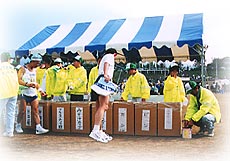 The data the club compiled on the Egusa region's
air and water temperatures was sent to NASA,
the U.S. National Aeronautics and Space Administration, through the GLOBE
(Global Learning and Observations to Benefit the Environment) Program, where
it is being used for research.
The data the club compiled on the Egusa region's
air and water temperatures was sent to NASA,
the U.S. National Aeronautics and Space Administration, through the GLOBE
(Global Learning and Observations to Benefit the Environment) Program, where
it is being used for research.
The
other activity is the club's campaign to collect and remove trash. The Egusa
region is located at the entrance to a popular tourist area, where garbage is
often tossed out onto the road. Once a month, the club responds by collecting
and separating a large volume of empty cans, cigarette butts, and other garbage,
while also handing out bags to passing drivers, reminding them to take their
garbage home with them and dispose of it properly rather than throw it out on
the roads.
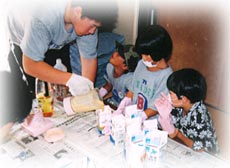 In areas where the littering problem was especially
bad, the amount of garbage has decreased considerably thanks to group activities
like planting flower beds and putting up signs. In addition to these activities,
the club has recently started collecting waste paper from the city and bringing
it to a factory that recycles it into toilet paper.
In areas where the littering problem was especially
bad, the amount of garbage has decreased considerably thanks to group activities
like planting flower beds and putting up signs. In addition to these activities,
the club has recently started collecting waste paper from the city and bringing
it to a factory that recycles it into toilet paper.
The club members are enthusiastic about urging
others to join in the local eco-activities: "We wear yellow uniforms during
our activities, so come and say hello if you see us"; "We'll be putting on the
waste campaign this year as well"; "Adults, let's protect the Earth together!"
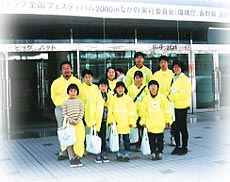 "I'm
proud of the way the kids always think up and plan the activities themselves,
and the way they make sure to see them through to completion," says supporter
Tetsuo Tasaki, describing the club's character. Last year, in recognition of
its activities to date, the club received an "Environmental Education Award"
sponsored by the Coca-Cola Foundation.
"I'm
proud of the way the kids always think up and plan the activities themselves,
and the way they make sure to see them through to completion," says supporter
Tetsuo Tasaki, describing the club's character. Last year, in recognition of
its activities to date, the club received an "Environmental Education Award"
sponsored by the Coca-Cola Foundation.
Photos: (From top) Eco-club members check the water quality of the
Shiokawa; the club promotes environmental preservation among tourists by handing
out garbage bags; making soaps by using empty milk cartons; a commemorative photo
taken when the group received an Environment Education Award from the Coca-Cola
Foundation. (Tetsuo Tasaki)


 Since it was started in
July 1995, Yamanashi Prefecture's Egusa Niko-Niko Children's Eco-Club has conducted
a variety of local environmental preservation activities in the town of Sutama.
At present, the club consists of 17 members: 5 middle and 7 elementary school
students, and 5 adult supporters.
Since it was started in
July 1995, Yamanashi Prefecture's Egusa Niko-Niko Children's Eco-Club has conducted
a variety of local environmental preservation activities in the town of Sutama.
At present, the club consists of 17 members: 5 middle and 7 elementary school
students, and 5 adult supporters.  The data the club compiled on the Egusa region's
air and water temperatures was sent to
The data the club compiled on the Egusa region's
air and water temperatures was sent to  In areas where the littering problem was especially
bad, the amount of garbage has decreased considerably thanks to group activities
like planting flower beds and putting up signs. In addition to these activities,
the club has recently started collecting waste paper from the city and bringing
it to a factory that recycles it into toilet paper.
In areas where the littering problem was especially
bad, the amount of garbage has decreased considerably thanks to group activities
like planting flower beds and putting up signs. In addition to these activities,
the club has recently started collecting waste paper from the city and bringing
it to a factory that recycles it into toilet paper. "I'm
proud of the way the kids always think up and plan the activities themselves,
and the way they make sure to see them through to completion," says supporter
Tetsuo Tasaki, describing the club's character. Last year, in recognition of
its activities to date, the club received an "Environmental Education Award"
sponsored by the Coca-Cola Foundation.
"I'm
proud of the way the kids always think up and plan the activities themselves,
and the way they make sure to see them through to completion," says supporter
Tetsuo Tasaki, describing the club's character. Last year, in recognition of
its activities to date, the club received an "Environmental Education Award"
sponsored by the Coca-Cola Foundation.